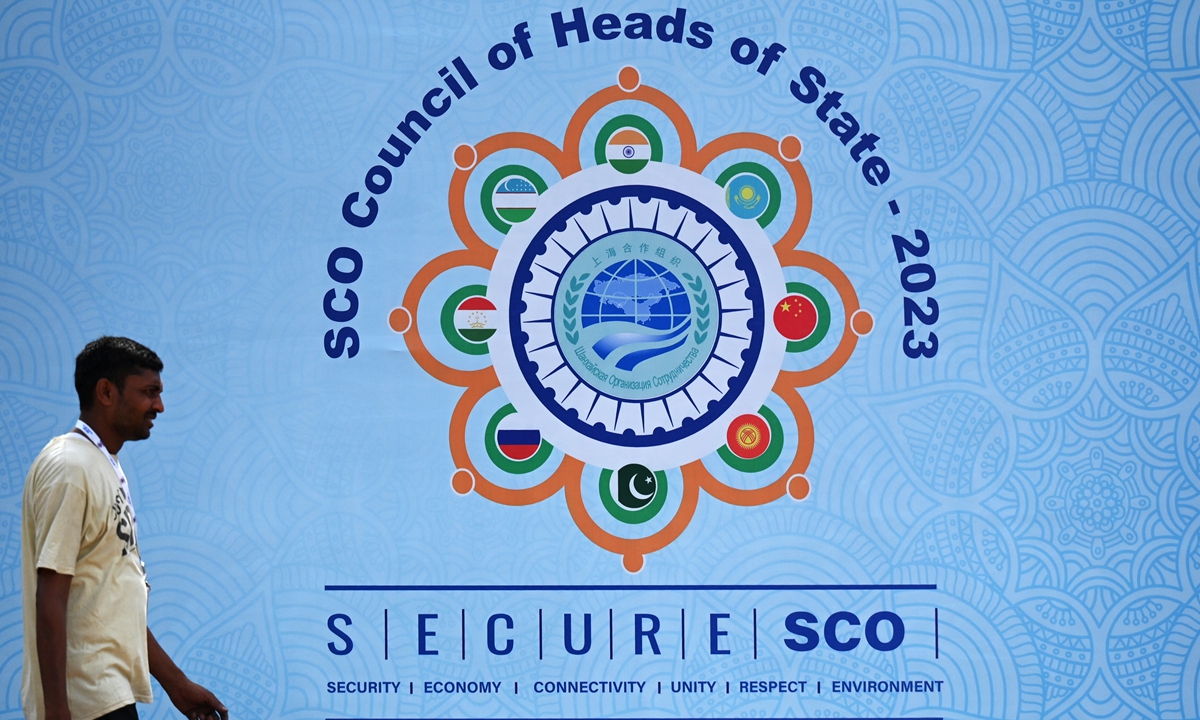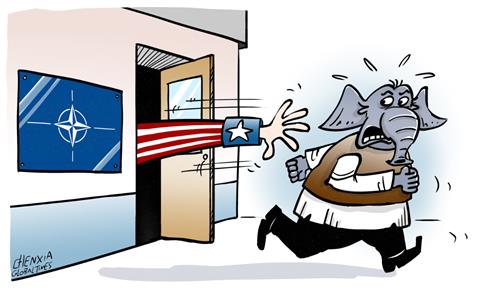
A man walks past the media center at the venue of Shanghai Cooperation Organisation (SCO) Council of Foreign Ministers' meeting in Goa on May 4, 2023.Photo: AFP
The 22nd summit of the Shanghai Cooperation Organisation (SCO) Council of Heads of State hosted by India will be held in the virtual format on July 4. After being held online from 2020 to 2021 because of the COVID-19 pandemic, the SCO summit resumed its in-person form in 2022, with the SCO foreign and defense ministers having already met each other face-to-face in India. India's sudden announcement on May 30 that the SCO Heads of State meeting will be held in the virtual format without explaining the reasons has surprised and puzzled the international community.
Moreover, after New Delhi's announcement, some voices in India started to analyze why the SCO summit has turned virtual. Some believe it is "due to its structural flaws," claiming that "the SCO is a gathering of nations mostly tied closely to China and Russia." "By moving the SCO summit to a virtual mode, India is sending out a message that groupings dominated by China are no longer New Delhi's priority," argues a retired major general of the Indian Army, who thinks this also sends a signal that India's priority is the G20.
There is no doubt that the G20, which is consisted of the world's most important economies, carries more weight than the SCO. However, the two groupings are not contradictory, and India is, for sure, not choosing one over the other. As a major country, India is well-positioned to host multiple multilateral summits in one year. Moreover, in recent years, India has actively engaged in multilateral diplomatic mechanisms to expand its international influence and increase its global presence. This includes many minilateral mechanisms, such as BRICS, the Quad, IBSA Dialogue Forum (India, Brazil and South Africa), the India-Central Asia Summit, and the I2U2 Group (US, India, Israel and UAE).
On the other hand, the SCO, since its establishment, has achieved fruitful cooperation results and has become the most important organization for regional cooperation in Eurasia. Joining the SCO has provided India with a vital platform to participate in regional affairs, especially counterterrorism, energy cooperation, strengthening connectivity with Central Asia, and participation in solving the Afghan issue. Now India has no reason to act indifferently to the SCO.
India has firmly pushed to enhance its relationship with the Global South this year. It is New Delhi's ambition to play a leading role in some organizations or mechanisms, but India's national strength cannot yet provide support. Objectively speaking, the country is currently not a dominant member in any global or regional organization or mechanism. Even the South Asian Association for Regional Cooperation, in which India is the biggest member, has been paralyzed by the India-Pakistan rivalry. It is more in India's reality and interest to engage more through the SCO.
Now, although New Delhi may show signs of indifference toward the SCO due to frictions with China, it will not move away from or withdraw from the SCO.
First, India cannot prevent cooperation between China and other SCO members. Even if India is cold toward the SCO or acts as an obstacle on certain issues, China and other members can simply exclude India from cooperation. Among the SCO members, China has corresponding cooperation mechanisms with other members, such as the China-Russia comprehensive strategic partnership of coordination for a new era, the China-Pakistan-Iran trilateral consultation on counter-terrorism and security, the China-Pakistan-Afghanistan trilateral cooperation mechanism, and, most recently, the China-Central Asia Summit.
Second, moving away or even withdrawing from the SCO would lead India to self-imposed isolation. While some Indians suggest their country give the SCO the cold shoulder, Iran and Belarus have decided to join the organization, and many other countries have shown interest in the SCO. Apparently, the organization will play a more critical role in the global future. Withdrawing from the SCO would leave India isolated in the region, which would not only weaken India's role in regional affairs but also lower India's strategic value in the US-led West.
Third, India would lose a mechanism to counterbalance Pakistan if it decided to snub the SCO. One of India's motives for joining the SCO in the first place was to offset Pakistan's possible influence in the organization, and India's counterterrorism claims are largely directed at Pakistan. Suppose India shows less presence in the SCO or even ceases to be a member of the SCO. In that case, it will inevitably make Pakistan more prominent, and India will not be able to prevent the SCO from becoming more receptive to Pakistan's claims.
Of course, the fact that SCO is being held online does not necessarily mean it cannot achieve results. As long as there is a need and willingness to cooperate, fruitful results can also be expected from virtual summits.
Long is a professor at the School of International Relations at Sichuan International Studies University (SISU). Wang is a student majoring in diplomacy at the SISU. opinion@globaltimes.com.cn


